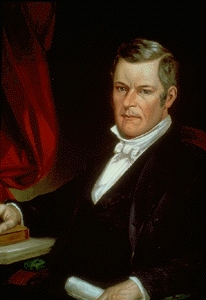James B. Ray | |
|---|---|
 | |
| 4th Governor of Indiana | |
| In office February 12, 1825 – December 7, 1831 | |
| Lieutenant | John H. Thompson Milton Stapp |
| Preceded by | William Hendricks |
| Succeeded by | Noah Noble |
| Indiana State Senator Senate president pro tempore | |
| In office December 2, 1822 – February 12, 1825 | |
| Indiana House of Representatives | |
| In office December 2, 1821 – December 2, 1822 | |
| Personal details | |
| Born | James Brown Ray February 19, 1794 Jefferson County, Kentucky |
| Died | August 4, 1848 (aged 54) Cincinnati, Ohio |
| Political party | Independent |
| Spouses | Mary Riddle
(m. 1818; died 1823)Esther Booker (m. 1825) |
| Children | 7 |
| Occupation | Lawyer |
James Brown Ray (February 19, 1794 – August 4, 1848) was an Indiana politician and the only Indiana Senate president pro tempore to be elevated to governor of the state of Indiana. Ray served during a time when the state transitioned from personal politics to political parties, but never joined a party himself. Taking office one week before his 31st birthday, he became the state's youngest governor and served from 1825 to 1831, the longest period for an Indiana governor under the state constitution of 1816. During Ray's term as governor the state experienced a period of economic prosperity and a 45 percent population increase. He supported projects that encouraged the continued growth and development of the young state, most notably internal improvements, Native American removal, codification of Indiana's laws, improved county and local government, and expanded educational opportunities. Ray was known for his eccentricity and early promotion of a large-scale railroad system in the state. His support for new railroad construction and alleged involvement in several scandals caused him to lose popularity among voters. Ray's opponents who favored the creation of canals considered railroads to be an impractical, utopian idea. Following Ray's departure from political office, he continued to advocate for a statewide railroad system until his death in 1848.